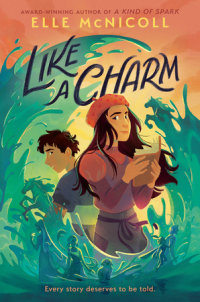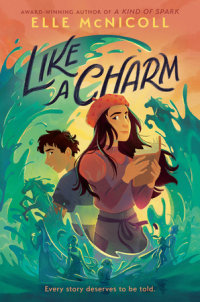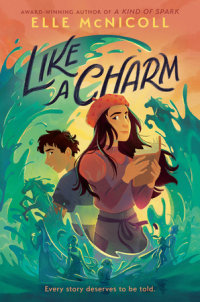Like a Charm
Like a Charm is a part of the Like a Charm collection.
After the death of her grandfather, nuerodivergent tween Ramya uncovers a world of mystery and magic—and she’s the only one who can see it! From the award-winning author of A Kind of Spark.
"McNicoll paints a vivacious portrait of one neurodivergent tween's experience navigating the world." -Publishers Weekly, starred review
Ramya Knox is used to feeling cursed. People only notice her long enough to call her a troublemaker. Except Grandpa. He sees Ramya and her neurodiversity as enchanting. But when Grandpa dies, Ramya's world loses its charm...until she discovers he left behind one big secret: that magic is real and Ramya can see it.
Trolls, vampires, kelpies, and more fantastical beings hide in the shadows for Ramya to discover. But the Hidden Folk need protection from the most dangerous creatures of all: the sirens. These beautiful monsters use their voices to get wahtever they want, and lately they want power. And anyone who resists, anyone who is different, simply...disappears.
It's up to Ramya to finish her grandpa's work and expose the sirens for the villains they are--before their voices frown out the human and Hidden worlds forever.
An Excerpt fromLike a Charm
Chapter One
Seven Years Ago
The first time I ever saw one of them was the night that I saw my grandfather for the last time.
It was a foggy evening in Kensington, London. I was five and allowed to come downstairs to my parents’ annual Christmas party, on the condition that I kept quiet and made myself useful by handing out the deviled eggs. I was the only person there my age; the adults towered over me like trees holding cocktail glasses.
I was invisible to them all. They laughed at things that weren’t funny, and always laughed too loudly. Some would make cooing noises at me and tell me my dress was pretty. I didn’t choose it, I thought it was ugly, but I said nothing.
Our house in London was narrow. High, but slender. People were crammed inside, and the presence of the guests stole every bit of air in the house. A mess of sound and smell and mystery to me. Seeing my parents and their friends outside the school playground, it was like entering a portal into another world. One of secret codes and a different language. One of false expressions. Sly glances and raised eyebrows. People would clink their glasses warmly, but their eyes were cool. Assessing.
Then I saw Grandpa. Like a fleck of gold underneath the dirt.
He was in the kitchen, washing his hands. I put my empty tray down on the table but ran toward him instead of picking up another.
“Ramya!”
At five, I was easy to lift up. I don’t remember every word he ever said to me, but I can remember how they reached inside me and made everything better. I laughed as he swung me around.
“It’s late for you to be up,” he said, not sounding the least bit disapproving. “Spotted something new under the tree?”
I beamed. I knew he would bring presents.
“Where’s Granny?”
“Home with a cold,” he replied. “She didn’t want to travel.”
“Oh, okay.”
“She picked out some of your presents, though.”
“There’s more than one?”
Mum and Dad disapproved of multiple presents, but Grandpa didn’t think there was any other way.
I pulled on his dry hand, leaning my whole small body in the direction of the front room. Most people were through there, the largest room in the house. He let me move him down the hall to join the others.
“Oh!” I suddenly remembered. “My tray.”
I hurried back into the kitchen, nodding to the hired member of staff as they handed me a new silver plate of food to give out. I concentrated very hard as I made my way back to the party, balancing the tray with care.
There was a crescendo of voices as I neared the room. I could hear Dad telling one of his work stories, over by the nine-foot Christmas tree. Mum was talking to some of her friends about how she didn’t like the school I was going to. Grandpa sat by the grand piano, ignored by the rest of the room. One finger on the keys.
I joined him, placing my tray down on the lid of the shiny black instrument.
He smiled at me, our smile. The one that only I got. “Want to open a present early?”
I almost knocked the tray over in my excitement. “Yes!”
We both glanced over at Mum. Grandpa was her father. He was every bit as soft as she was hard. Every part understanding, when she was quick to anger. Every bit warm, when she was . . .
He handed me a gift. A parcel wrapped in gold, with a pink satin ribbon.
“Granny wrapped it,” he explained. “She’s the master.”
I laughed. Granny was dazzling and she liked everything to be beautiful and unique. I couldn’t rip her paper; I opened the present with such care and thought. Knowing that the end result would be worth it.
And it was.
A soft woolen hat with a little nub in its middle. Baby pink, with red hearts. The material was so gentle; I noticed it was the same kind that my grandparents’ sweaters were always made of.
“A hat!” I exclaimed, placing it on my head.
“A beret,” he corrected, reaching over to tilt it slightly, so that it sat upon my long dark hair at an angle. “Your granny knows how smart you are. Now she wants you to be stylish.”
I grinned. Only they ever told me that I was smart. Mum would get frustrated when I knocked things over, always muttering “Useless.” Dad would just glance over, grimace, and then go back to his newspaper or his phone.
“I love it,” I told Grandpa.
I turned with delight and vigor to grab my tray, only to stop dead. A tall woman with alabaster skin and a shimmering dress stood close to me. She grinned down at me, with teeth that were too white.
Every hair on my body stood on end. Every goose bump rose. It was like a thousand sewing needles were pressing against my skin.
“Play me a song?” she asked, her voice like wind chimes. Only it wasn’t really a question at all. She wasn’t asking.
I stared up at her.
Something flickered in her face. Like a ripple.
“Play me something,” she repeated. A touch more weight in her voice.
I still could not move. I was frozen. I simply continued staring, feeling the urge to run.
Suddenly, Grandpa moved behind me. He settled himself upon the piano stool and began to play. As the music began, the woman settled. Her mouth turned up into a smile.
Then she opened her mouth. And sang.
I tore my eyes from her to look around the room. Everyone had stopped their conversation. Their gazes were all pinned to the woman, like a dog watching its master. She was singing a Christmas carol. In front of a fire, by a piano, to a room full of attentive listeners at a party. There was nothing unusual or untoward about any of it.
To them. To everyone else in the room. To me, something I couldn’t name had happened. Something horrifying.
As she sang “O Come, O Come,” her voice so pure and perfect, everyone seemed to move closer.
And I dropped my tray.
The sound of the silver crashing against the newly varnished floor was abrasive and shocking. Everyone started, including the woman. Grandpa stopped playing.
I glowered back at the woman. Defiantly.
The grin was completely gone from her face this time. She opened her mouth to say something when--
“Ramya!”
Mum appeared, pushing through the crowd. She grabbed my elbow.
“So sorry about that,” she apologized to the woman profusely. “She’s very clumsy. Way past her bedtime.”
I thought about resisting as Mum began to walk me out of the room, but I was relieved to be going. I didn’t want to be near that woman. I didn’t want her in my house. I didn’t want her near my family.
Mum marched me upstairs and into my room. She was angry, I could tell. She hauled open a drawer and pulled out some fresh pajamas before throwing them down on the bed.
“Get into these, brush your teeth, and then you’re going to come down and apologize to Portia.”
“No.”
She glanced up in astonishment. “Excuse me?”
“No.”
Dad appeared in the doorway, always the peacekeeper. He had heard the last part of the conversation.
“Come on, Rams,” he said, his accent English. Not Scottish, like Mum’s and Grandpa’s. “Accidents happen, but you need to come and say good night.”
“No.” I repeated the word again. I had such a need to say it, more than ever before. It was instinctive. It was raw.
My parents were both completely flabbergasted. They gaped at each other in disbelief.
“I beg your pardon,” Mum murmured, her voice dangerously quiet.
“Leave the girl be.”
We all turned to see Grandpa. He had his coat and hat on, like he was ready to go home.
“Dad.” Mum’s voice was clipped and tight. “Go back downstairs. This is a family matter.”
“Yes, and I’m family,” Grandpa told her sternly. “Go back to your guests and stop snarling at the poor thing. She’s too wee to be at one of your soirées anyway.”
Mum obeyed him, shooting me one last glare as Dad followed behind her. I could hear them muttering about my “sass” as they went back down to the party.
I suddenly felt the urge to cry.
“Now, now.” Grandpa knelt in front of me and handed me a handkerchief from his woolen coat pocket. I examined it with a slightly trembling hand. It was white, with thistles embroidered on it. Each thistle had a letter. J, I, L, C, and O.
“James for me,” he said, reading my mind. “Isabelle for your grandmother. Leanna for your mum’s older sister.”
“Cassandra for Mum,” I said softly.
“Exactly so. And Opal for your youngest aunt.”
My aunt. I had spoken to Aunt Leanna a couple of times over the phone. Her son was my age. She was bubbly and laughed a lot.
I had never met Aunt Opal.
“Your grandfather’s favorite,” Mum always said, perhaps a tad bitterly.
I wiped my eyes with the handkerchief and handed it back.
Grandpa regarded it for a moment. “Leanna sees the very best in people; your cousin is just like her. Your mother always sees the very worst. And your aunt Opal sees people for exactly what they are.”
He looked around the room and a decision crossed his face.
“Ramya, what did you notice about that woman?”
My head shot up. I gawped at him. His face was completely serious, but his eyes were kind.
“Oh, yes,” he said gently. “You noticed something, didn’t you?”
“Noticed” was not the correct word, though. “I felt something.”
“What did you feel?”
I was young then. I couldn’t articulate what it was. I couldn’t tell him that I just knew something was wrong the moment I heard her speak.
“I was scared.”
He nodded. Listening to me. Taking me seriously. “But you didn’t do what she wanted.”
“What?”
“She asked you to play something. And you didn’t.”
I was confused. I tried to shake the confusion out of my head. “I don’t understand.”
“She asked you twice, and you didn’t even think of doing it, did you?”
He wasn’t telling me off. He was encouraging me. “No.”
He barked out a laugh and hugged me. “Brave girl. Clever girl.”
“I don’t understand,” I repeated.
“I know. I know you don’t, pet. It’s all okay. I want you to remember something: you belong at home. It’s too easy to hide in this big city, too easy to vanish into the smoke.”
“Home is here?”
“No, home is in Scotland. Someone with your gifts--”
“I don’t have gifts,” I said quietly, confused.
“It is a gift to look a command in the face and be able to tell the commander ‘no.’ Which is what you did tonight.”
I wrinkled my nose. “I tell people ‘no’ all the time.”
He positioned the beret once more, beaming at me in a way that made all my fears vanish. “Ramya, something is coming. Something is brewing, I can feel it every day as I walk in the street. Every time I turn on a television. Every time I open a newspaper. I feel it, and most people are too numb to notice. But not you. I knew it. You’re special. You’re just like--”
“So sorry to interrupt.”
We both leaped to our feet. The strange woman stood in the doorway, her face serene but her eyes very sharp. Mum and Dad stood behind her.
“Portia has kindly come up to hear your apology, Ramya,” Dad said pointedly. “So come on. Let’s hear it.”
To this day, I don’t know what part of me told me to do it. But I stared directly at the woman and said, “I’m not sorry.”
Portia’s expression froze in place. Mum and Dad both made noises of horror. Mum strode into the room and grabbed me by the wrist.
“Apologize,” she snapped, her mouth drawn tight and her eyes almost bulging in rage.
“No.”
Portia let out a gasp. Dad closed his eyes.
“That’s it,” Mum snapped. “Get into bed. No privileges for you until next year, Ramya. Do you hear me?”
I nodded, never taking my eyes away from the tall woman in the doorway. She watched me right back. She seemed fascinated, as if I was something truly unexpected.
Mum barked at Grandpa to leave the room before he could say another word. They all made their way downstairs once more, Dad promising that this matter would be discussed in the morning. Portia was the last to leave and I was left alone in the dark.
I lay in bed for an hour, listening to the guests as their voices faded away. One by one, they left. I felt the door close each time. I could tell when Portia was leaving because I could hear Mum and Dad apologizing once more. Telling her that I was not normally this rude. That I was still learning how to be around people. That they were humiliated.
Then, once she was gone, the shouting began.
Mum was shouting. Grandpa was raising his voice. Dad was wearily trying to calm everything down.
I slipped out of bed and scurried across the landing, sitting halfway down the stairs, my face pressed between two pillars beneath the banister.
“I told you not to bring those stupid tales into this house,” Mum snapped. “I’m sick of hearing about your strange obsessions. You’re not poisoning Ramya with it.”
“Cass, she is lucky. You’re lucky. Don’t you see, she isn’t like any of us.”
“Yes, thank you for that, I’m well aware.” Mum’s voice was frenzied and exhausted. “We’re being dragged into her Early Years class every other week to hear all about how unlike other people she is. Do you know she can’t even hold a pen yet?”
I flinched.
“That’s not important,” Grandpa replied softly. “She’s got something better than all of those other children. She’s the reason we might actually have a fighting chance. Don’t waste this child’s life with silly ideas about ‘normal,’ when she has something--”
“Oh, Dad, shut up.” Mum’s voice was fragile, like she was about to cry. “Just stop. Get out. Get out and don’t send cards. Don’t call. Don’t come around here anymore. I’m done. I’m through. I can’t do this all over again. Get out and don’t come back.”
There was a horrible silence. I waited for Mum to take it back immediately, to say she was sorry, but she didn’t. There was a long pause. I wondered if they were each waiting to see if the other would back down, give in and say to forget the whole messy evening and that strange, hypnotic lady. But neither did. Mum let out a frustrated breath, her entire body radiating dismissal. Then Grandpa turned to go.





